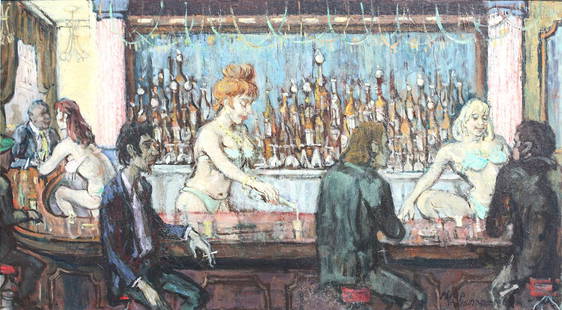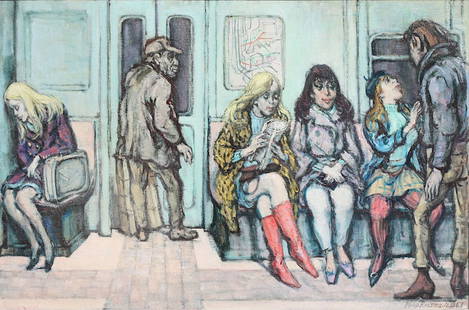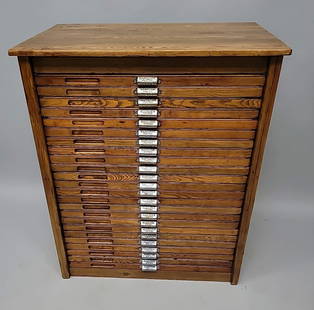
Emmanuel Garibay (b. 1962) Manangmana ng Tagapagmana
Similar Sale History
View More Items in PaintingsRelated Paintings
More Items in Paintings
View MoreRecommended Art
View More


Item Details
Description
Manangmana ng Tagapagmana
signed and dated 2013 (lower left)
oil on canvas
48" x 48" (122 cm x 122 cm)
Accompanied by a certificate signed by the artist confirming the authenticity of this lot
In 1988, the eminent scholar Benedict Anderson coined the term cacique democracy to refer to the country's feudal politics, which was consolidated during the American colonial period. The affluent mestizos benefited from colonial policies and affairs, thus maneuvering their way towards greater power. "One final feature of the American political system is...the huge proliferation of provincial and local elective offices—in the absence of an autocratic territorial bureaucracy," Anderson writes. "From very early on, mestizo caciques understood that these offices, in the right hands, could consolidate their local political fiefdoms. Not unexpectedly, the right hands were those of family and friends. Brothers, uncles, and cousins for the senior posts; sons and nephews for the junior ones." The mestizo caciques, which Anderson referred to, eventually evolved into the ruling class—the political dynasties—of the present. Emmanuel Garibay lampoons political dynasties, the most formidable manifestation of cacique democracy, in Manangmana ng Tagapagmana. Here, the artist visually expounds on how political power is treated like a family heirloom inherited by succeeding generations. Garibay presents two barong-clad men depicting a father and his son. A portrait of a tuxedo-clad older man hangs in the background. Their faces are uncannily similar, their hands indicating the uniquely Filipino way of suggesting one is handsome or 'pogi.' Of interesting note is the dog held by the son. In political conversations, the word 'tuta' or lapdog denotes subservience, usually in the context of power dynamics between imperialist states and thirdworld countries. But here, Garibay uses the term as an allegory for political grooming within the country's oligarchic system; how the elder "crafts" the image of their successor so they carry on with the family's hegemony. Garibay's comical depiction of the subjects as dapper f igures alludes to an entrenched culture of 'papogi,' the deliberate branding of the family's image—often employing fabricated truths—to perpetuate themselves in power. A 'thumbs up' gesture is carved on the chair in which the father and son sit, denoting how our current system of governance (that is ironically dominated by the ruling elite) has never barred the proliferation of political dynasties. A man's head covertly pops out from the water, symbolizing how the masses will always remain vigilant and thus, fight back against their viciousness and atrociousness. The ruling class may have distinct statures, yet they still originate from the same oppressive and repressive ranks. The effrontery of dynasties subverts the essence of democracy. Unless radical social change is engendered, there can be no escape from a system that rewards only the few. (A.M.)
Buyer's Premium
- 22%
Emmanuel Garibay (b. 1962) Manangmana ng Tagapagmana
Estimate ₱600,000 - ₱780,000
Shipping & Pickup Options
Item located in Makati City, Metro Manila, phSee Policy for Shipping
Payment

TOP




































![G. Inness landscape painting: G [eorge] Inness landscape painting, American 1825 - 1894, signed lower right (1860), oil on canvas, forest landscape, image - 14 1/2" x 22 1/2" in a gilt wood 18" x 26" frame. Condition: paint loss,](https://p1.liveauctioneers.com/456/327253/176343465_1_x.jpg?height=310&quality=70&version=1713894337)
![R S Bredin portrait painting: R [ae] S [loan] Bredin portrait painting, Pennsylvania 1880 -1933, oil on canvas, "Poly", 3/4 portrait of seated lady in formal gown holding fan. Site 47" x 39", frame 53" x 45". Condition: one small](https://p1.liveauctioneers.com/456/327253/176343510_1_x.jpg?height=310&quality=70&version=1713894337)








![A. Moreav-Neret large oil on canvas: A [drian].Moreav-Neret (1860 - 1944 French) large oil on canvas, depicting Lady in prayer with angel, 80 1/2" x 120"., signed lower left, unframed. Condition: 2 screw holes on middle ends, small areas](https://p1.liveauctioneers.com/456/327253/176343471_1_x.jpg?height=310&quality=70&version=1713894337)























